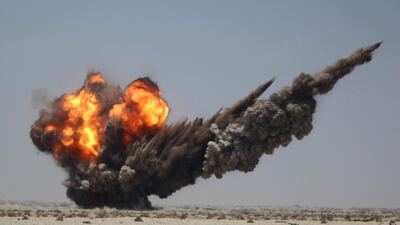ADEN // Fierce fighting erupted on Wednesday in Taez city where Houthi rebels attempted to seize more territory ahead of a Yemeni truce planned for next week.
The fighting in Taez came as Saudi Arabia said that two people had been killed in a Saudi town by shelling from northern Yemen, undermining recent promises from the rebels to halt fighting in border areas.
The Iran-backed Houthis have sent reinforcements to Taez from Hodeida province as they attempt to break a deadlock in the city. Taez has suffered some of the worst fighting in the conflict.
Resistance forces loyal to the internationally recognised government, supported by air strikes from the Saudi-led coalition, clashed with the Houthis in districts across the city as they tried to hold their position.
Nabil Al Adimi, a leader with the popular resistance, told The National that they confronted attacks by the Houthis in the Air Defence Camp and Al Zonoog area north of the city. There were also clashes in Gabal Habashi district, 30 kilometres from the city.
“The Houthis are still trying to advance in more areas in the province before the peace talks,” the commander added.
He said more than 10 coalition airstrikes had targeted the Houthis to try and stop them from gaining territory.
A number of resistance fighters had been killed, he added, but would not say how many.
Meanwhile, the Houthis continued to hit residential areas of Taez, with 10 civilians injured since Tuesday.
Shells from northern Yemen also killed two people in a Saudi town, the Saudi civil defence agency said, in a rare breach of a calm in the border area agreed with Iran-backed rebels early last month.
“Shelling from Yemeni territory on Samtah left two people dead and wounded a child,” the agency said on Twitter late on Tuesday.
Saudi foreign minister Adel Al Jubeir said on Monday that a rebel delegation was holding talks in Riyadh, ahead of a planned UN-brokered truce on April 11 which is to be followed by peace negotiations in Kuwait on April 18.
The Saudi-led coalition of mostly Arab states announced on March 9 that after negotiations though tribal mediators, it had agreed to an exchange of prisoners and a “state of calm” along the Saudi-Yemeni border to enable the delivery of desperately needed aid.
Dozens of people have been killed on the Saudi side of the border since the coalition launched its intervention in March last year after the rebels and their allies overran much of the country.
In Yemen, around 6,300 people have been killed since march.
* With additional reporting from Agence France-Presse

